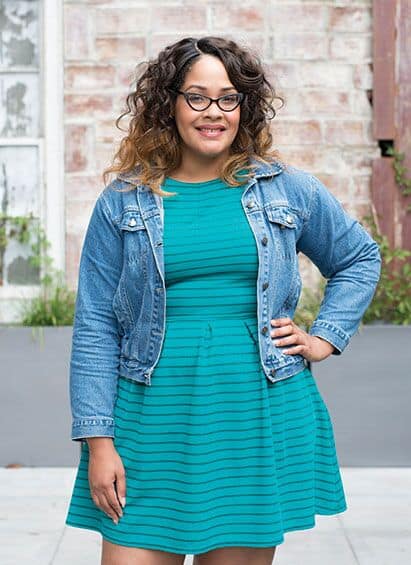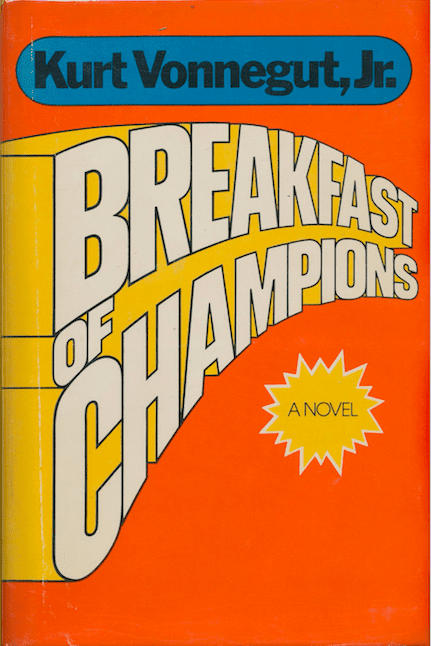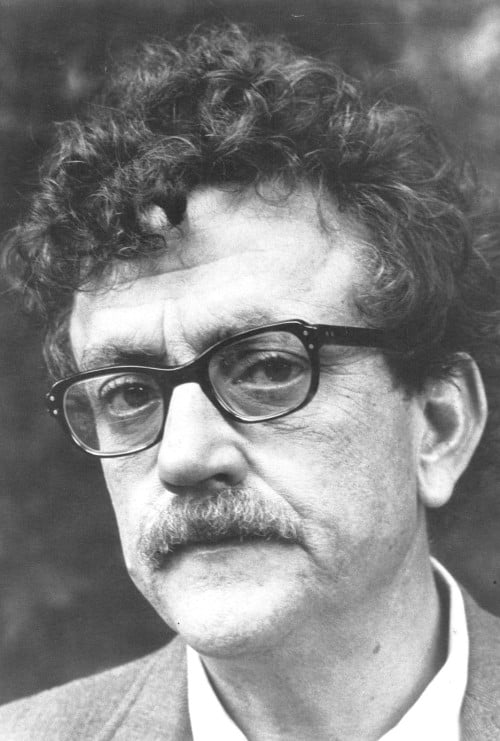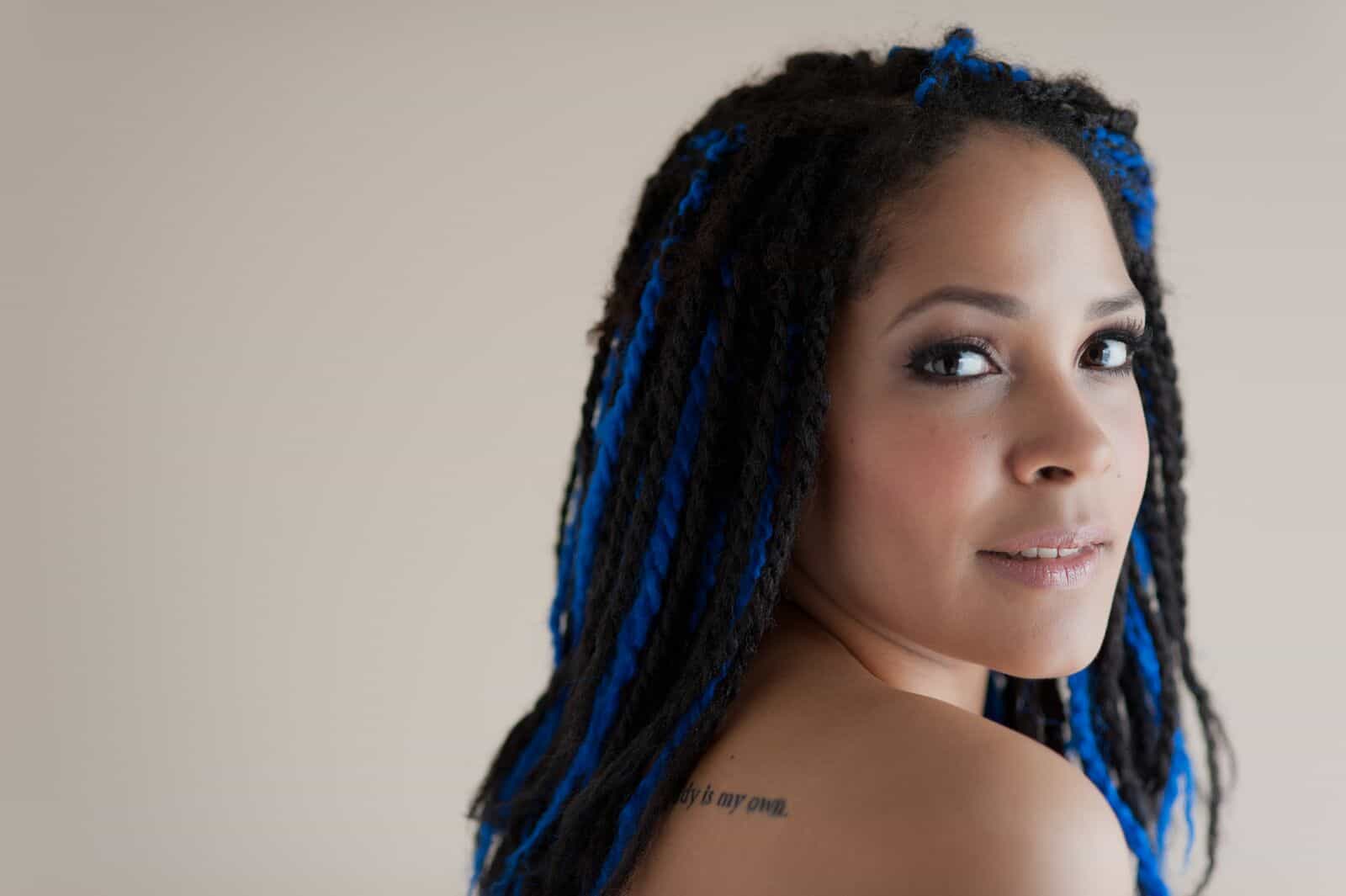“Wheaties were still pretty big then,” laughs Ijeoma Oluo as she explains her motivation behind picking up Breakfast of Champions (Delacorte Press, 1973) at the library.
Then fourteen years old, the Seattle-based writer, speaker and editor at large at The Establishment had just finished reading Ray Bradbury’s The Martian Chronicles for school. With Bradbury’s world in mind, she was drawn by the description on the back of Kurt Vonnegut’s classic novel. “It seemed weird,” Ijeoma says. “Even though they were different authors, Vonnegut and Bradbury also had that everything-is-disconnected-and-connected feel about their work.”

Photo by Chustine Minoda
Breakfast of Champions is the story of Dwayne Hoover, a wealthy businessman, and Kilgore Trout, a widely published, though essentially unknown, author. While in the same city, Trout gives Hoover a copy of his new novel. Trout’s novel claims that everyone in the world – save for the reader – is a robot. Hoover takes the content of Trout’s novel to be factual, and, well, all hell breaks loose. Among other themes, the book examines free will and mental illness. Vonnegut, as himself, also features prominently in the story.
After reading this first book, Ijeoma – who writes about race, social justice, and feminism, among many issues – was hooked. “From then on, I was just stuck on Vonnegut. I read so much Vonnegut in my teens years.”
Her relationship with the author’s work continued well beyond her adolescence. In fact, her best friend at the time she started reading Vonnegut “ended up being diagnosed with frontal lobe epilepsy and had been institutionalized. Even well into adulthood, when there were very little things we could talk about, we could still talk about Vonnegut. The world kind of looks the same to us when we’re reading Vonnegut.”
Ijeoma spoke with me from Seattle.
EK: How did you react to Breakfast of Champions?
IO: I absolutely loved it. I was fascinated by it. It was so absurd. As a kid, few things that you read are absurd, or at least were then. Everyone wants kids to be so serious about what they read. And it was weird to see absurdity in serious literature.

Was there anything about the book that particularly resonated with you and that maybe, in hindsight, affected your writing today?
What has stuck with me is how heartbreaking it can be to be an optimist. And [Vonnegut] really was. I think a lot of people don’t get that. Something I got from this book was that he was in this constant state of heartbreak for humanity, which he was in love with. And he always wanted better and he was forever disappointed. A lot of people think of him as a pessimist. He was the opposite to me; it seemed like he was always hopeful. But the book would show the toll that can actually take on you – being genuinely hopeful, while at the same time, honestly viewing the world. That stuck with me.
Did the fact that Vonnegut broke the fourth wall change your view of storytelling because you are so involved in all the stories you tell, even when they’re news stories?
Definitely. Vonnegut had shown me that you can take these things personally. And I think that inserting himself into the story is wonderful because it is important to remember there is a person behind this story with an agenda and thoughts. He did it so well with all these little drawings and illustrations. All these things reminded you there’s a man, sitting here, chuckling to himself, writing this out. He’s deeply involved in the story and he’s there with you. I’ve found in my own writing that showing people I’ve gone down the path I’m asking them to go down is important. It’s almost a way of earning that effort that they’re going to put into read it.
Do you feel a connection between the discussion he starts about mental illness, given the way you’ve talked so candidly about your experience with mental health?
I loved the way he normalized it for me. One thing I learned about Vonnegut was that these weren’t pieces about mental illness but about the human condition. Just as you would incorporate every other aspect of life into it, mental health is a part of it and he refused to cut it out. And I think that that’s incredibly healthy. I know from reading about Vonnegut and listening to interviews that he and his family suffered a long time from the effects of mental illness. But I also know he was very vocal about not refusing himself joy when it came. He was so open and did not hide. It definitely helped me grow up feeling much less shame and stigma around mental illness just knowing that it could be talked about. It wasn’t something you had to say in a dark room after you really trusted someone. It was something you could just blurt out in casual conversation because it’s part of life.

Have your tastes changed since you were the fourteen year old who loved this book? Is she still very much part of you?
People who’ve known me a long time like to joke that I was born forty. It’s just the way I’ve always been. I think I’m closer now to who I was at fourteen than I was five years ago. I spent a lot of time working in the corporate world, not writing, not doing anything creative, focusing on things that really didn’t matter to me whatsoever, and now every step that I get closer, I feel closer to that person that I wanted to be when I was fourteen than I’ve ever been.
You know, society likes to ruin things for you, and society really likes to ruin Vonnegut for you by looking at how complicated and flawed he was as a person. I’m still going to always be that fourteen year old. His work is still going to stand on its own to me. And I can read it differently now. I can look at the way Vonnegut talks about race and chuckle at times and cringe at times. I also know that what I think I know of him is different than who he was because I’m a writer and I see what that difference looks like. I can see what these snapshots of time look like and that people change, but at the same time, the picture that he painted still stands and it’s still amazing to me.
Follow Ijeoma @IjeomaOluo, Erica @ericaruthkelly




 Follow Us On Instagram
Follow Us On Instagram
